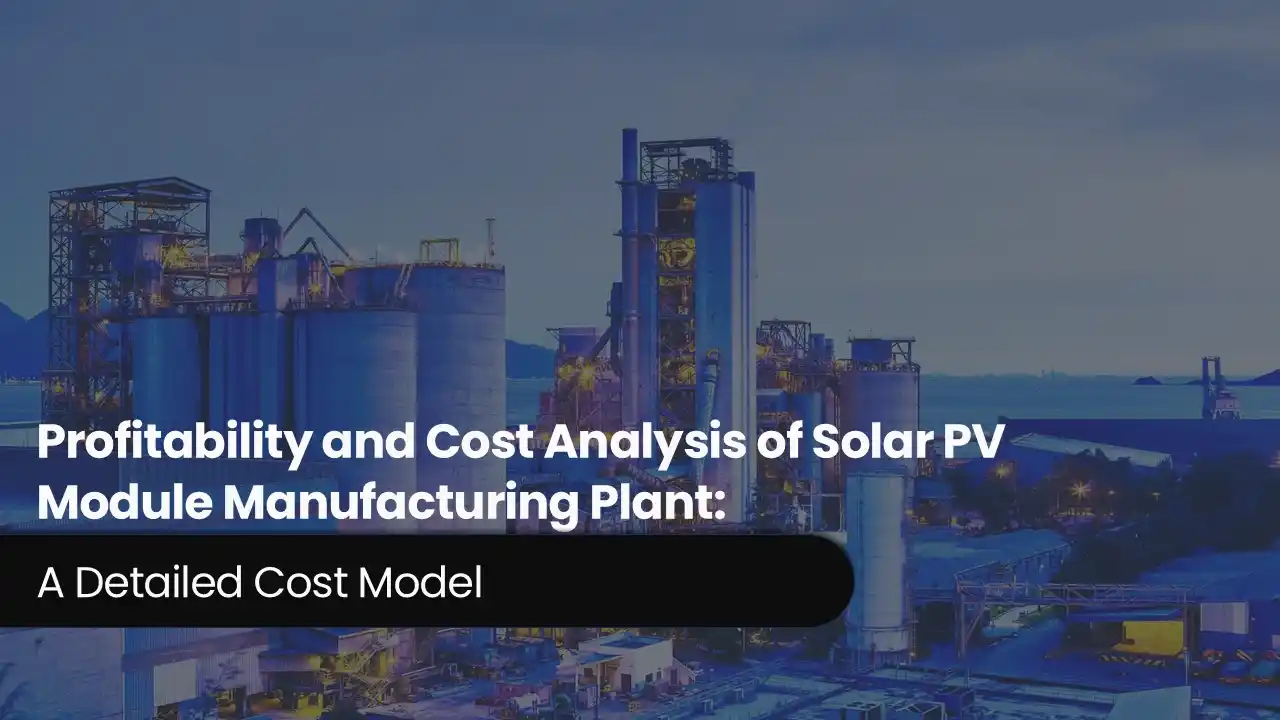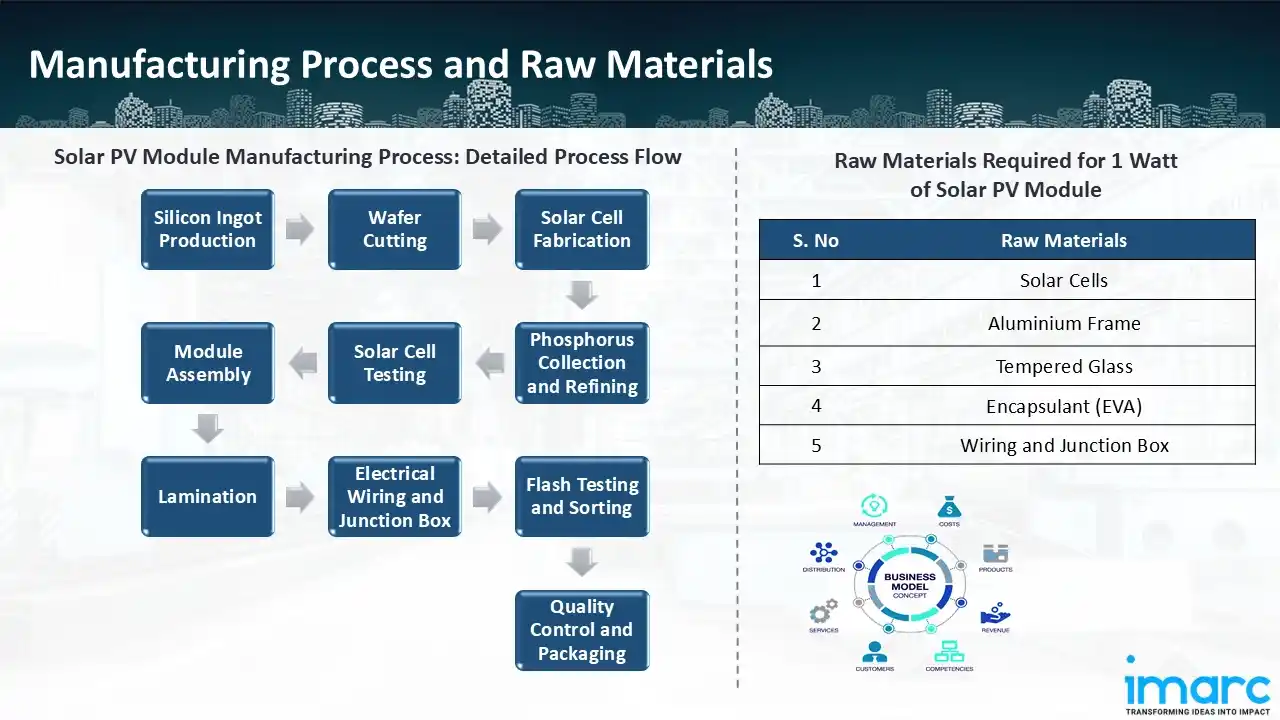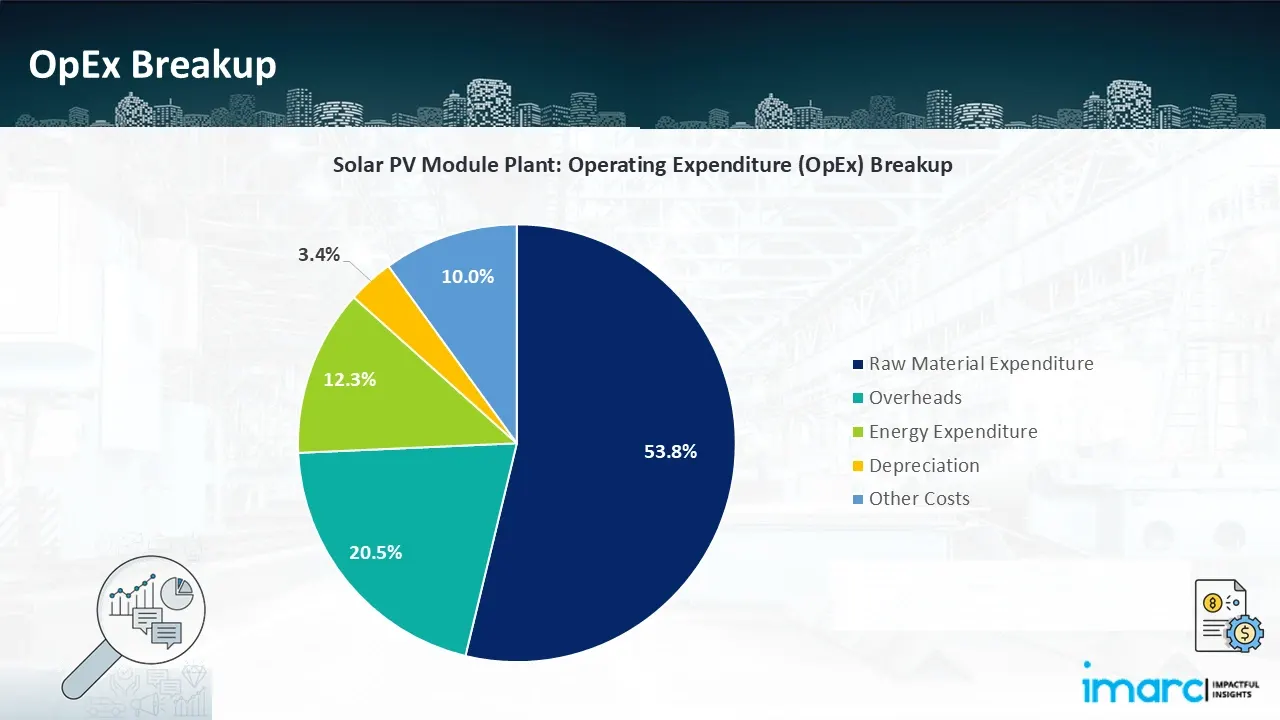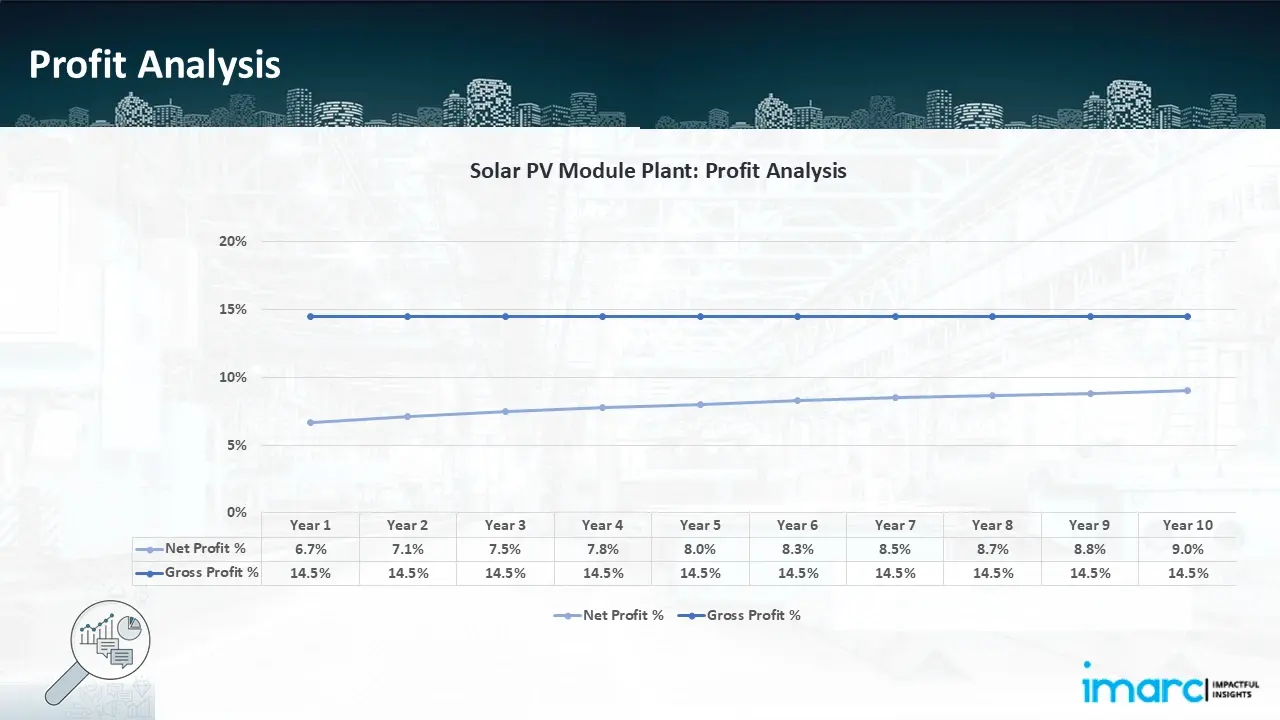Profitability and Cost Analysis of Solar PV Module Manufacturing Plant: A Detailed Cost Model

What is Solar PV Module?
Polycrystalline solar photovoltaic (PV) modules are a key component of solar energy systems, harnessing sunlight and converting it into electricity through the photovoltaic effect. These modules are composed of multiple interconnected solar cells, each made from polycrystalline silicon.
Key Applications Across Industries:
Polycrystalline solar panels are renowned for their efficiency, affordability, and versatility, making them a popular choice for various applications such as solar installations, commercial and industrial projects, off-grid systems and solar farms.
What the Expert Says: Market Overview & Growth Drivers
According to an IMARC study, the global solar PV module market size reached 1,386.1 TWh in 2024. Looking ahead, the market is expected to grow at a CAGR of approximately 14.36% from 2025 to 2033, reaching a projected capacity of 4,919.2 TWh by 2033. A number of important factors are driving the market for solar PV modules. Global adoption of solar energy is being aided by government policies and incentives like net metering schemes, tax breaks, and subsidies.
Additionally, solar energy is becoming more economical due to economies of scale and technological breakthroughs that have reduced the cost of solar PV modules. Another significant motivator is the growing need for renewable energy to fight climate change and lower carbon footprints. The market is expanding because of rising corporate and governmental sector investments in solar infrastructure. The dependability of solar electricity is being increased by developments in energy storage and better battery technologies. Additionally, market potential are developing due to the development of floating solar farms, building-integrated photovoltaics (BIPV), and growing industrial and commercial use.
Case Study on Cost Model of Solar PV Module Manufacturing Plant:
Objective
One of our clients has approached us to conduct a feasibility study for establishing a mid to large-scale solar PV module manufacturing plant in Barmer, Rajasthan, India.
IMARC Approach: Comprehensive Financial Feasibility
We have developed a detailed financial model for the plant's setup and operations. The proposed facility is designed with an annual production capacity of 1,000 MW (1 GW) of solar PV module.
Manufacturing Process: The first step in the production of solar PV modules is the melting and solidification of high-purity silicon pieces into polycrystalline ingots. These ingots, which serve as the foundation for solar cells, are composed of various crystal formations. The ingots are sliced into thin wafers during the wafer cutting stage using wire saws or diamond-tipped blades. After that, these wafers are polished to guarantee a flat surface, readying them to produce solar cells. Texturing (to improve light absorption), diffusion (doping with phosphorus to create an electrical charge), anti-reflection coating (to reduce energy loss), screen printing (applying metal contacts for current collection), and firing (to bond the contacts to the silicon) are some of the crucial steps in the fabrication of solar cells. To guarantee effectiveness, the cells are put through a thorough electrical testing process after manufacture. After that, the cells are put together into solar modules by aligning them in parallel or series, encasing them between layers of EVA, covering them with tempered glass, and fastening a polymer backsheet for security. The modules go through a process called lamination, in which the layers are joined by pressure and heat. After installing the junction box and electrical wiring, each module is flash-tested to ensure proper operation. Lastly, before the modules are packaged and ready for delivery, quality control inspections are carried out.

Get a Tailored Feasibility Report for Your Project Request Sample
Raw Material Required: The primary raw materials utilized in the solar PV module manufacturing plant include solar cells, tempered glass, aluminium frame, encapsulant (EVA), and wiring and junction box.
Techno-Commercial Parameter:
- Capital Investment (CapEx): Capital expenditure (CapEx) in a manufacturing plant includes various investments essential for its setup and long-term operations. It covers machinery and equipment costs, including procurement, installation, and commissioning. Civil works expenses involve land development, factory construction, and infrastructure setup. Utilities such as power, water supply, and HVAC systems are also significant. Additionally, material handling systems, automation, environmental compliance, and safety measures are key components. Other expenditures include IT infrastructure, security systems, and office essentials, ensuring operational efficiency and business growth.
- Operating Expenditure (OpEx): Operating expenditure is the cost incurred to operate a manufacturing plant effectively. OpEx in a manufacturing plant typically includes the cost of raw materials, utilities, depreciation, taxes, packing cost, transportation cost, and repairs and maintenance. The operating expenses are part of the cost structure of a manufacturing plant and have a significant effect on profitability and efficiency. Effective control of these costs is necessary for maintaining competitiveness and growth.

- Profitability Analysis Year on Year Basis: The proposed solar PV module plant, with a capacity of 1,000 MW (1 GW) solar PV module annually, achieved an impressive revenue of US$ 169.0 million in its first year. We assisted our client in developing a detailed cost model, which projects constant growth, with revenue rising throughout the projected period. Moreover, gross profit stood constant at 14.5%, and net profit rise from 6.7% to 9.0%, highlighting strong financial viability and operational efficiency.

Conclusion & IMARC's Impact:
Our solar PV module manufacturing plant's financial model was meticulously modelled to satisfy the client's requirements. It provided a thorough analysis of production costs including capital expenditures, manufacturing processes, raw materials, and operating costs. The model predicts profitability while accounting for market trends, inflation, and any shifts in the price of raw materials. It was created especially to satisfy the demand of producing 1,000 MW (1 GW) of solar PV module per day. Our commitment to offering precise, client-cantered solutions that ensure the long-term success of significant industrial projects by giving the client useful data for strategic decision-making is demonstrated by this comprehensive financial model.
Latest News and Developments:
- In February 2025, Mexico has set a target to install 4.67 GW of large-scale photovoltaic (PV) capacity by 2030 as part of its renewable energy strategy. It is anticipated that this program will increase the use of solar electricity, lower carbon emissions, and improve energy security. The strategy might draw large investments in the solar industry and is consistent with Mexico's commitment to clean energy transitions.
- In February 2025, Shakti Pumps has reaffirmed its commitment to expansion in the face of growing demand under the PM-KUSUM plan by announcing an additional purchase of DCR cell-based solar modules from ReNew Photovoltaic for FY 2025–2026, valued at INR 1,300 crore.
- In February 2025, ACME Solar has teamed up with GREW Solar to launch a solar power initiative in Bikaner, Rajasthan. The goal of this partnership is to boost the region's renewable energy capacity by leveraging advanced solar technologies. The project aligns with India's clean energy goals and is expected to contribute to the country's growing solar power generation.
- In January 2025, a INR 455 crore deal for the sale of 300 MWp solar modules has been acquired by TP Solar, a division of Tata Power Renewable Energy Ltd (TPREL). This contract supports India's renewable energy objectives by showcasing the nation's expanding solar energy industry. Large-scale solar projects will employ the modules, increasing domestic solar adoption and production.
- In January 2025, Vikram Solar has secured a 1GW solar module order to support various renewable energy projects This significant agreement supports the country's drive for the expansion of renewable energy sources and highlights the company's dominant position in the solar manufacturing industry in India. The modules will support India's clean energy objectives by helping to meet the rising need for sustainable power solutions.
Why Choose IMARC:
IMARC's Financial Model Expertise: Helping Our Clients Explore Industry Economics
IMARC is a global market research company that offers a wide range of services, including market entry and expansion, market entry and opportunity assessment, competitive intelligence and benchmarking, procurement research, pricing and cost research, regulatory approvals and licensing, factory setup, factory auditing, company incorporation, incubation services, recruitment services, and marketing and sales.
Brief List of Our Services: Market Entry and Expansion
- Market Entry and Opportunity Assessment
- Competitive Intelligence and Benchmarking
- Procurement Research
- Pricing and Cost Research
- Sourcing
- Distribution Partner Identification
- Contract Manufacturer Identification
- Regulatory Approvals, and Licensing
- Factory Setup
- Factory Auditing
- Company Incorporation
- Incubation Services
- Recruitment Services
- Marketing and Sales
Under our factory setup services, we assist our clients in exploring the feasibility of their plants by providing comprehensive financial modeling. Additionally, we offer end-to-end consultation for setting up a plant in India or abroad. Our financial modeling includes an analysis of capital expenditure (CapEx) required to establish the manufacturing facility, covering costs such as land acquisition, building infrastructure, purchasing high-tech production equipment, and installation. Furthermore, the layout and design of the factory significantly influence operational efficiency, energy consumption, and labor productivity, all of which impact long-term operational expenditure (OpEx). So, every parameter is covered in the analysis.
At IMARC, we leverage our comprehensive market research expertise to support companies in every aspect of their business journey, from market entry and expansion to operational efficiency and innovation. By integrating our factory setup services with our deep knowledge of industry dynamics, we empower our clients to not only establish manufacturing facilities but also strategically position themselves in highly competitive markets. Our financial modeling and end-to-end consultation services ensure that clients can explore the feasibility of their plant setups while also gaining insights into competitors' strategies, technological advancements, and regulatory landscapes. This holistic approach enables our clients to make informed decisions, optimize their operations, and align with sustainable practices, ultimately driving long-term success and growth.
Our Clients
Contact Us
Have a question or need assistance?
Please complete the form with your inquiry or reach out to us at
Phone Number
+91-120-433-0800+1-201-971-6302
+44-753-714-6104











